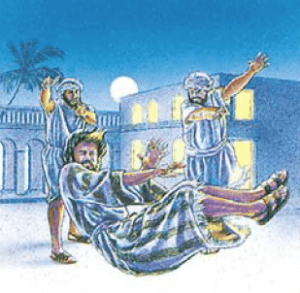PJ54
Well-known member
*** Text for Friday, May 20, 2022 ***King Saul did not obey Jehovah. And when the prophet Samuel confronted him about the matter, Saul did not acknowledge his mistake. Instead, he tried to justify his actions by minimizing the consequences of his disobedience and shifting the blame to others. (1 Sam. 15:13-24) Earlier, Saul had displayed a similar attitude. (1 Sam. 13:10-14) Sadly, he allowed his heart to become haughty. He did not correct his thinking, so Jehovah reproved him and rejected him. To learn from Saul’s example, we do well to ask ourselves these questions: ‘When I read counsel from God’s Word, do I tend to justify my thinking? Do I minimize the consequences of disobedience? Do I shift the blame for my actions to someone else?’ If our answer to any of those questions is yes, we must adjust our thinking and attitude. Otherwise, our heart can become so haughty that Jehovah will reject us as his friend. w20.11 20 ¶4-5
God opposes the haughty ones, but he gives undeserved kindness to the humble ones.—Jas. 4:6.

King Saul – A Type of the Evil Slave
Saturday, January 28 Let me pin him to the ground with the spear just once, and I will not need to do it twice.—1 Sam. 26:8. When Abishai crept into Saul’s camp, he did not have his loyalties in the proper order. Out
King Saul – A Type of the Evil Slave

Saturday, January 28 2017
Let me pin him to the ground with the spear just once, and I will not need to do it twice.—1 Sam. 26:8.When Abishai crept into Saul’s camp, he did not have his loyalties in the proper order. Out of loyalty to David, Abishai was eager to kill King Saul, but David restrained him, realizing that it would be wrong to lift one’s hand “against the anointed of Jehovah.” From that incident, we learn an important lesson: Although we can properly have several loyalties in our heart, the correct order of their importance should be determined by our application of Bible principles. Loyalty springs from the heart, but the human heart is treacherous. Thus, one who is loyal to God could easily feel strong ties of loyalty to a close friend or relative even if that person is practicing what is bad. Especially when someone close to us abandons the truth must we remember that Jehovah always merits our primary loyalty.
COMMENTARY
There are Bible principles a-plenty that we can apply to any and every situation in life. But it is important to fully understand the dynamics of the account in order to make the correct application of the principle.On more than one occasion I have had Jehovah’s Witnesses cite the two occasions where David had the opportunity to kill Saul, but he refused, saying that it was unthinkable on his part to personally thrust out his hand against the anointed of Jehovah. They applied that principle to my work, implying that I have disregarded the sanctity of the anointed leadership of Jehovah’s Witnesses and thrust out my hand against them in criticism. Such an application, though, does not take into consideration that Saul was a presumptuous king, deserving of death; and in fact, God ultimately abandoned him to a most inglorious end at the hands of the Philistines. However, the full application of the David/Saul saga yields some interesting parallels.
First, though, the Watchtower article upon which the day’s text is based applies the principle in a much different way. The loyalty that David displayed by not killing Saul when the opportunities presented themselves can be imitated by Jehovah’s Witnesses by their strictly adhering to the Watchtower’s policy of shunning disfellowshipped loved ones or those who simply no longer wish to be known as Jehovah’s Witnesses.
Interestingly, there is a similarity. Saul had originally accepted David into his family, giving him his daughter in order to form a marriage alliance. And his son, Jonathan, formed a strong bond of friendship with David too. Keep in mind, that although Saul was the anointed of Jehovah, David had been anointed afterwards and that was why the shepherd boy was empowered by Jehovah’s spirit to slay the hulking giant, Goliath.
Naturally, Saul came to view David with suspicion even though he realized that Jehovah was with David, which became apparent when David paid twice the dowry Saul had imposed, providing 200 foreskins of dead Philistines, instead of the 100 demanded by Saul.
In time Saul became more erratic and unreasonable. He was determined to hold onto his kingship by any and all means necessary —even murdering his son-in-law. But Jonathan remained loyal to David, even though he knew that it would mean that he would not be heir to his father’s throne. To be sure, Jonathan’s loyalty to David is the real lesson.
After David fled and met up with Samuel, Jehovah’s priest and prophet, Saul sent three groups of messengers to apprehend the fugitive. But instead of taking him into custody Jehovah’s spirit came upon them all and they began behaving as prophets, whatever that entailed. Finally, Saul personally came to kill the anointed of Jehovah, but he too was overcome by God’s spirit and began behaving as a prophet, so that he stripped off his royal garments and lay naked on the ground all night.
Eventually Saul directed his wrath against his own son for his remaining loyal to Jehovah’s anointed. In other words, Jonathan refused to obey his father’s command to cut off his friendship with his family member. (David and Jonathan were by then brothers-in-law by virtue of David’s marriage to Michal, Jonathan’s sister.)
Saul well pictures the evil slave of Christ’s illustration. Interestingly, after Saul had gained victories over Israel’s enemies he presumptuously pushed ahead and instead of waiting on Samuel the priest, he offered up a sacrifice to Jehovah. This reminds us of the Watchtower’s presumption in not waiting upon the High Priest, Jesus; instead, declaring that Christ has already returned and poured out his blessing upon them.
In Christ’s illustration the evil slave begins to associate with the drunkards of the world. This has played out with the Watchtower’s hypocritical affiliation with the United Nations and their hobnobbing with the high rollers of the financial world. Saul’s visit to the witch of Endor and his resorting to necromancy may have a future parallel with the coming of Christ, when the man of lawlessness shows himself to be a god, employing Satan’s uncanny power.
The evil slave begins beating his fellow slaves too. This is reflected by the Watchtower’s relentlessly pushing Jehovah’s Witnesses to do more and more. And in their increasingly stringent demand that JW’s have no contact with family members who may be disfellowshipped or disassociated – just as Saul berated his own son and daughter for their continuing to support David. (While the principle of disfellowshipping is certainly valid, there is nothing in the Scriptures that requires Christians to shun their parents or children.)
As for behaving as a prophet, the Watchtower boasts that it is the prophet —laying claim to being the two witnesses, the Ezekiel class, the Jeremiah class, the Micah class, etc. And certainly God’s spirit has come upon them, exposing their naked condition —just like crazy king Saul. This is reflected in the fact that nothing the prophet class has published is true.
Remember, too, when Saul was first anointed to be Israel’s king he was genuinely humble. But in time he grew more and more prideful and presumptuous and eventually turned his back on Jehovah altogether. Saul was not content that David was crushing Jehovah’s enemies wherever he went. Saul wanted the glory for it and could not countenance any praise going toward David. Because of his bad heart Jehovah’s bad spirit came upon him.
Similarly, the Watchtower had a humble beginning. But over the years it too has developed a proud and haughty demeanor. It is not content to merely publish Bible-based material and offer encouragement and support to Jehovah’s Witnesses. It demands to be glorified as Jehovah’s untarnished and infallible mouthpiece. It seeks to dominate all of those who have been anointed. It countenances no rival and will judicially kill any and all who dare to question its holiness.
Eventually Jehovah took Saul out and David became king. Likewise, in time the evil slave will be exposed. Like Jannes and Jambres, his madness will be plain for all to see. Then Jesus will exalt a new leadership to the fore. Then the greater David will impose a test of loyalty upon all of those who previously supported “Saul.”
No wonder the Watchtower no longer considers types and antitypes valid.




